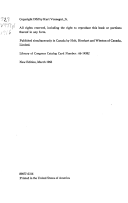Quotes from book
Player Piano

Player Piano is the first novel by American writer Kurt Vonnegut, published in 1952. It depicts a dystopia of automation, describing the negative impact it can have on quality of life. The story takes place in a near-future society that is almost totally mechanized, eliminating the need for human laborers. The widespread mechanization creates conflict between the wealthy upper class, the engineers and managers, who keep society running, and the lower class, whose skills and purpose in society have been replaced by machines. The book uses irony and sentimentality, which were to become hallmarks developed further in Vonnegut's later works.

“Everybody's shaking in his boots, so don't be bluffed.”
Source: Player Piano (1952), Chapter 22 (p. 219)

“And a step backward, after making a wrong turn, is a step in the right direction.”
Source: Player Piano (1952), Chapter 32 (p. 295)

“Things don't stay the way they are," said Finnerty. "It's too entertaining to try to change them.”
Source: Player Piano (1952), Chapter 34 (p. 313)

“Yesterday's snow job becomes today's sermon.”
Source: Player Piano (1952), Chapter 9 (p. 93)
Context: "Strange business," said Lasher. "This crusading spirit of the managers and engineers, the idea of designing and manufacturing and distributing being sort of a holy war: all that folklore was cooked up by public relations and advertising men hired by managers and engineers to make big business popular in the old days, which it certainly wasn't in the beginning. Now, the engineers and managers believe with all their hearts the glorious things their forebears hired people to say about them. Yesterday's snow job becomes today's sermon."

Source: Player Piano (1952), Chapter 9 (p. 86)
Context: "You think I'm insane?" said Finnerty. Apparently he wanted more of a reaction than Paul had given him.
"You're still in touch. I guess that's the test."
"Barely — barely."
"A psychiatrist could help. There's a good man in Albany."
Finnerty shook his head. "He'd pull me back into the center, and I want to stay as close to the edge as I can without going over. Out on the edge you see all kinds of things you can't see from the center." He nodded, "Big, undreamed-of things — the people on the edge see them first."

“Democracy owed its life to know-how.”
Source: Player Piano (1952), Chapter 1 (p. 9)
Context: During the war, in hundreds of Iliums over America, managers and engineers learned to get along without their men and women, who went to fight. It was the miracle that won the war — production with almost no manpower. In the patois of the north side of the river, it was the know-how that won the war. Democracy owed its life to know-how.

“Bad guys turned informer. Good guys didn't — no matter when, no matter what.”
Source: Player Piano (1952), Chapter 31 (p. 293)
Context: Here it was again, the most ancient of roadforks, one that Paul had glimpsed before, in Kroner's study, months ago. The choice of one course or the other had nothing to do with machines, hierarchies, economics, love, age. It was a purely internal matter. Every child older than six knew the fork, and knew what the good guys did here, and what the bad guys did here. The fork was a familiar one in folk tales the world over, and the good guys and the bad guys, whether in chaps, breechclouts, serapes, leopardskins, or banker's gray pinstripes, all separated here.
Bad guys turned informer. Good guys didn't — no matter when, no matter what.